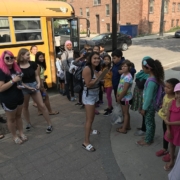6 Steps to Fearlessly Lead an Online Community
 What’s the difference between productive online conversations and angry online snipping matches?
What’s the difference between productive online conversations and angry online snipping matches?
Leadership.
Online communities are powerhouses of collaboration that demand fearless leaders to succeed. They otherwise become vacuums of disinformation and vitriol that inevitably fail.
The best social managers build constituencies with purpose and a strategy for growth. They ensure that members exchange valuable information, advice and ideas. They administer a steady flow of content that’s timely, relevant and encourages feedback. They ask thoughtful questions and respond to comments.
Yet, with the demand for new communities and the never-ending desire to increase engagement, such best practices for moderation become overlooked. Gimmicks, games and luck aside, sustainable engagement requires skill and intelligence.
Such administrators nurture and promote a safe, inviting atmosphere for all. Here is how to become an effective online community leader.
1. Create new communities largely through leveraging connections within existing networks such as culling prospects from social fan pages or LinkedIn groups. As they grow, and more diverse members join, the dynamic influences the direction of the group organically.
Great leaders catalyze that evolution by encouraging users to market the community through their own electronic newsletters, websites and multiple social accounts. They also delegate responsibility to develop loyalty and to prepare future leaders.
2. Draw insight from outside the commonwealth into the dialogue. They generally have already established themselves as experts through other on- and offline mediums. Well-connected managers selflessly concern themselves with developing the community and fostering their own deep understanding of the issues at play.
3. Many members of groups sit silently in the bleachers. They watch interactions but rarely participate. Devise activities that enable them to feel like active contributors by encouraging involvement.
Rather than force involvement, thriving communities “build benches” for those on the sidelines. They create opportunities to engage. They provide content to share. They initiate challenges such as Facebook currently encouraging members to compare their first profile photo to their current picture.
4. Dynamic group interactions happen in public and in private spaces. The heart of online communication is the web, but the dimensions of the physical community are interrelated. As online relationships between members strengthen, real world events become richer.
Participants who know each other well will attend more gatherings. People interact and network with one another. The more new connections produced, the more productive the meetings become.
5. Concentrate on value. Communities thrive when they deliver a return on investment for users. Successful leaders create events, activities and relationships that emerge autonomously. Rewarding faithful contributors with certificates of recognition, giveaways or heavily discounted services never hurts either.
6. Nourish excitement and action. Energetic communities combine simple and compelling opportunities for members to grow and succeed. Excitement remains vital for users to become fully engaged. Routine activities provide stability for relationship-building, but stimulating events offer the sense of joint adventure.
Once established, the test of sustainable communities happens when the original moderators eventually leave. True leaders identify those core participants who contribute most significantly and groom them to take the reins upon their departure.
The desire for a common sense of belonging is part and parcel of the human condition. We all seek a welcoming opportunity to share thoughts and ideas, as well as draw strength in numbers. It explains the success and popularity behind massive historical online collaborations such as Wikipedia, Napster and Linux.
It Takes a Village to build an energetic and flourishing online forum, and connecting purposefully is happening more and more frequently.
In 2019 an estimated 2.77 billion (up from 2.46 billion in 2017) social network users around the globe will engage in an average of eight accounts.
Who in the world could possibly organize all of that activity? We all will, and the best, brightest and boldest minds among us will lead online communities into the future, however they might develop.
Bruce Fikowski is the CEO of Get Assist, Inc. He resides in Calgary, Alberta.














Leave a Reply
Want to join the discussion?Feel free to contribute!